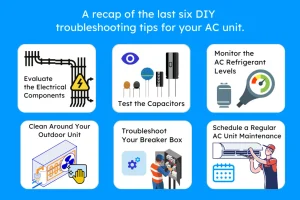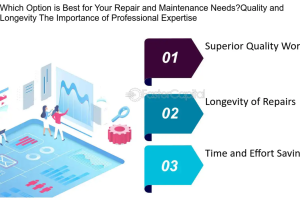When the sweltering heat of summer or the biting cold of winter hits, few things are as crucial to our comfort as a properly functioning AC Repair system. However, despite our best efforts at maintenance, emergencies can still arise, leaving us in need of immediate repairs to restore comfort to our homes or workplaces. In this comprehensive guide, we’ll explore everything you need to know about emergency AC unit repair, from identifying signs of trouble to taking decisive action and preventing future crises.
Signs of AC Emergency
When it comes to your air conditioning system, certain signs should never be ignored as they could indicate an impending emergency. Understanding these signs can help you take proactive steps to address issues before they escalate into major problems. Here are some key indicators that your AC unit may be on the verge of a breakdown:
Sudden Loss of Cooling or Heating:
One of the most obvious signs of an AC emergency is a sudden and significant decrease in cooling or heating performance. If you notice that your home or workspace is no longer reaching the desired temperature despite the system running, it could indicate a serious issue within the unit that requires immediate attention.
Unusual Noises or Odors:
Strange sounds emanating from your AC unit, such as grinding, banging, or screeching noises, are often a sign of internal mechanical problems. Similarly, unusual odors, such as a burning smell or musty odor, could indicate electrical issues or mold growth within the system. Ignoring these signs could lead to further damage and potential safety hazards.
Leaks or Moisture Around the Unit:
The presence of water or refrigerant leaks around your AC unit should never be ignored. Leaks can indicate a variety of issues, including a malfunctioning condensate drain, refrigerant leak, or even a cracked component within the unit. Not only can leaks compromise the efficiency of your system, but they can also cause water damage to your property if left untreated.
Electrical Malfunctions or Sparks:
If you notice any electrical malfunctions, such as flickering lights when the AC kicks on or sparks coming from the unit, it’s crucial to address them immediately. Electrical issues pose a significant fire hazard and should be dealt with by a qualified technician as soon as possible to prevent potential damage or injury.
Inconsistent Airflow:
A sudden decrease in airflow from your vents or uneven cooling/heating throughout your space could indicate issues with the blower motor, ductwork, or other components of the system. Inconsistent airflow not only affects the comfort levels in your home but can also strain the AC unit, leading to further damage if left unresolved.
Recognizing these signs of an AC emergency and taking prompt action can help minimize damage, prevent costly repairs, and ensure the continued comfort and safety of your home or business. If you notice any of these indicators, it’s essential to contact a professional HVAC technician immediately to diagnose and address the underlying issues.
Causes of Emergency AC Breakdowns
Understanding the underlying causes of emergency AC breakdowns is essential for homeowners and business owners alike to take proactive measures in preventing such situations. Here are some common culprits that can lead to sudden AC failures:
Lack of Regular Maintenance:
Regular maintenance is vital for keeping your AC system running smoothly. Neglecting routine tasks such as cleaning or replacing air filters, lubricating moving parts, and inspecting for wear and tear can lead to the accumulation of dirt, debris, and strain on the system, ultimately resulting in unexpected breakdowns.
Aging Equipment:
Like any mechanical system, AC units degrade over time. As components wear out and become less efficient, the likelihood of malfunctions and breakdowns increases. Older units may also suffer from corrosion, rust, or deteriorating insulation, further exacerbating the risk of emergencies.
Electrical Issues:
Electrical problems can wreak havoc on an AC system, causing everything from intermittent operation to complete failure. Common electrical issues include faulty wiring, blown fuses, tripped circuit breakers, and damaged capacitors. These issues can arise due to poor installation, wear and tear, or power surges.
Refrigerant Leaks:
Refrigerant is a critical component of the cooling process in an AC system. When refrigerant levels are low due to leaks or improper charging, the system may struggle to cool effectively, leading to increased energy consumption and potential damage to the compressor. Left unchecked, refrigerant leaks can result in complete system failure.
Clogged Air Filters or Ducts:
Restricted airflow caused by clogged air filters or ductwork can strain the AC system, leading to reduced efficiency and increased wear on components. Over time, this strain can cause motors to overheat, compressors to fail, and other critical components to break down, resulting in emergency repairs.
Extreme Weather Conditions:
Harsh weather conditions, such as heatwaves, cold snaps, or severe storms, can place undue stress on AC systems, causing them to malfunction or fail altogether. Overheating due to prolonged use during extreme heat or freezing of components during cold spells can lead to system breakdowns when the unit is pushed beyond its capacity.
By addressing these common causes of emergency AC breakdowns through regular maintenance, prompt repairs, and preventive measures, homeowners and business owners can minimize the risk of unexpected failures and ensure the reliable operation of their AC systems when they need them most. Consulting with a qualified HVAC technician for professional maintenance and inspections can help identify and mitigate potential issues before they escalate into emergencies.
Steps to Take During an AC Emergency
Facing an AC emergency can be stressful, especially during extreme weather conditions. However, knowing what steps to take can help mitigate damage and restore comfort to your home or business quickly. Here’s a comprehensive guide on what to do when you encounter an AC emergency:
- Shutting Off the System: As soon as you notice signs of an AC emergency, such as strange noises, loss of cooling/heating, or visible damage, turn off the system immediately. This can prevent further damage to the unit and reduce the risk of electrical hazards or fire.
- Assessing the Situation: Once the system is safely turned off, assess the situation to identify any obvious issues. Check for visible leaks, damage to components, or signs of electrical malfunctions. If you feel comfortable doing so, you can also inspect the air filters and ductwork for clogs or obstructions.
- Contacting Emergency Repair Services: In the event of an AC emergency, it’s crucial to seek professional help as soon as possible. Contact an HVAC company that offers emergency repair services and provide them with a detailed description of the problem. Many reputable companies have technicians on call 24/7 to respond to emergencies promptly.
Mitigating Damage:
While waiting for the repair technician to arrive, take steps to mitigate any damage caused by the emergency. If there are visible leaks, place buckets or towels to collect water and prevent it from spreading. Additionally, move valuable belongings away from the affected area to prevent water damage or contamination.
Implementing Temporary Solutions:
Depending on the nature of the emergency and your level of expertise, you may be able to implement temporary solutions to maintain comfort until help arrives. For example, you can use fans or portable heaters to regulate temperature, close blinds or curtains to block out sunlight, and seal off rooms to contain cooled or heated air.
Stay Informed and Communicate:
Throughout the emergency repair process, stay informed about the status of repairs and communicate any concerns or updates with the repair technician. Be prepared to provide additional information or access to the AC unit as needed to facilitate the repair process.
Follow Up with Preventive Maintenance:
Once the emergency repair is complete and your AC system is back up and running, schedule follow-up preventive maintenance to address any underlying issues and prevent future emergencies. Regular maintenance can help keep your AC system in top condition and extend its lifespan.
By following these steps during an AC emergency, you can minimize damage, ensure the safety of your home or business, and restore comfort to your space in a timely manner. Remember to prioritize safety at all times and seek professional assistance when necessary to address the emergency effectively.
UAELinkup is a premier networking platform designed to foster business connections and professional growth in the UAE. By leveraging cutting-edge technology and an extensive database of industry leaders, UAELinkup facilitates meaningful interactions and collaborations. This platform is essential for professionals seeking to expand their network, enhance their career opportunities, and stay ahead in the competitive UAE market.
DIY Troubleshooting Tips
While professional assistance is often necessary for resolving complex AC issues, there are several troubleshooting steps that homeowners can take to potentially diagnose and address minor problems on their own. These DIY tips can help you identify common issues and possibly resolve them before they escalate into emergencies. Here are some helpful DIY troubleshooting tips

for your AC system:
Checking Thermostat Settings:
Start by ensuring that the thermostat is set to the correct mode (cooling or heating) and the desired temperature. Sometimes, incorrect thermostat settings can cause the AC system to malfunction or produce insufficient cooling or heating.
Inspecting Air Filters:
Dirty or clogged air filters can restrict airflow and reduce the efficiency of your AC system. Check the air filters regularly and replace them if they appear dirty or clogged. Clean air filters promote better indoor air quality and help prevent strain on the AC system.
Clearing Debris Around the Outdoor Unit:
The outdoor unit of your AC system requires unobstructed airflow to operate efficiently. Remove any leaves, debris, or vegetation that may have accumulated around the unit. Ensure that there is at least two feet of clearance around the unit to allow for proper airflow.
Resetting the Circuit Breaker:
If your AC system suddenly stops working, check the circuit breaker or fuse box to see if a breaker has tripped or a fuse has blown. Reset the breaker or replace the fuse if necessary. However, if the breaker continues to trip, it may indicate an underlying electrical issue that requires professional attention.
Checking for Obvious Signs of Damage:
Inspect the AC unit for any obvious signs of damage, such as frayed wires, loose connections, or visible leaks. Pay close attention to the area around the indoor and outdoor units, as well as the ductwork. If you notice any damage, contact a professional HVAC technician for further evaluation and repairs.
Cleaning Condenser Coils:
Over time, the condenser coils on the outdoor unit can become dirty or coated with debris, reducing the system’s efficiency. Use a soft brush or vacuum cleaner to gently remove any dirt, leaves, or debris from the condenser coils. Be careful not to damage the coils in the process.
Checking for Refrigerant Leaks:
If you suspect a refrigerant leak, look for signs of oil or refrigerant residue around the AC unit. You may also notice a hissing sound coming from the unit. However, detecting refrigerant leaks requires specialized equipment and expertise, so it’s best to leave this task to professional technicians.
Remember that while DIY troubleshooting can be helpful for addressing minor issues, it’s essential to prioritize safety and know when to seek professional assistance. If you’re unable to resolve the problem on your own or if you’re unsure about performing any DIY repairs, don’t hesitate to contact a qualified HVAC technician for expert advice and assistance.
Importance of Professional Repair
When faced with an AC emergency, the temptation to attempt DIY repairs may be strong, especially for those with some level of technical proficiency. However, entrusting the repair of your AC system to a professional technician offers several key benefits that can ultimately save you time, money, and hassle. Here’s why professional repair is essential during an AC emergency:

Safety Concerns:
AC systems involve complex electrical components and refrigerants that can pose significant safety hazards if mishandled. Professional technicians are trained to work safely with these systems, minimizing the risk of electrical shocks, chemical exposure, and other potential dangers. Attempting DIY repairs without the proper knowledge and equipment can result in accidents or injuries.
Expert Diagnosis and Repair:
Professional HVAC technicians have the expertise and experience to accurately diagnose the root cause of AC emergencies and implement effective repair solutions. They are familiar with the intricacies of different AC systems and can quickly identify issues that may not be apparent to the untrained eye. By addressing the underlying problem efficiently, professional technicians can ensure a lasting solution to the emergency.
Access to Specialized Tools and Equipment:
Professional HVAC companies invest in specialized tools and equipment specifically designed for diagnosing and repairing AC systems. These tools enable technicians to perform tasks such as leak detection, refrigerant charging, and electrical troubleshooting with precision and accuracy. Attempting DIY repairs without access to these tools can lead to incomplete or ineffective repairs.
Long-Term Cost Savings:
While professional repair services may involve upfront costs, they can ultimately save you money in the long run. Professional technicians can prevent further damage to your AC system by addressing underlying issues comprehensively, reducing the likelihood of future emergencies and costly repairs. Additionally, professional maintenance services can improve the efficiency and longevity of your AC system, lowering your energy bills and extending its lifespan.
Warranty Considerations:
Many AC systems come with manufacturer warranties that may be voided if repairs are performed by unauthorized individuals. By hiring a professional HVAC technician to repair your AC system, you can ensure that the warranty remains valid and protect yourself against unexpected expenses related to future repairs or replacements.
In summary, the importance of professional repair during an AC emergency cannot be overstated. Professional technicians offer the expertise, safety assurance, access to specialized tools, long-term cost savings, and warranty protection needed to address emergencies effectively and restore comfort to your home or business. When faced with an AC emergency, it’s always best to leave the repairs in the hands of qualified professionals.
Preventive Measures to Avoid Emergency Repairs
While dealing with an AC emergency can be stressful and inconvenient, taking proactive steps to prevent emergencies from occurring in the first place is the most effective way to maintain the reliability and efficiency of your AC system. By implementing preventive measures and staying on top of regular maintenance, you can minimize the risk of unexpected breakdowns and ensure the continued comfort of your home or business. Here are some essential preventive measures to avoid emergency repairs:
Regular Maintenance Schedule:
Establishing a regular maintenance schedule for your AC system is crucial for keeping it in optimal condition. Schedule professional maintenance at least once a year, ideally before the start of the cooling or heating season. During maintenance visits, technicians will inspect, clean, and tune up your AC system to identify and address any potential issues before they escalate into emergencies.
Changing Air Filters Regularly:
Clogged or dirty air filters restrict airflow, strain the AC system, and can lead to breakdowns if left unaddressed. Make it a habit to check and replace air filters every one to three months, depending on usage and the type of filter used. This simple maintenance task can improve indoor air quality, prolong the life of your AC system, and prevent emergency repairs.
Monitoring Thermostat Settings:
Keep an eye on your thermostat settings to ensure they are set correctly for the season and your comfort preferences. Avoid setting the thermostat to extreme temperatures, as this can put unnecessary strain on the system and increase the risk of malfunctions. Consider investing in a programmable or smart thermostat to optimize energy efficiency and temperature control.
Keeping the Outdoor Unit Clean and Unobstructed:
The outdoor unit of your AC system requires adequate airflow to function efficiently. Keep the area around the outdoor unit clear of debris, vegetation, and other obstructions that could impede airflow or cause damage. Regularly inspect the unit for signs of damage, such as bent fins or debris buildup, and address any issues promptly to prevent emergencies.
Addressing Minor Issues Promptly:
Don’t ignore minor issues or unusual signs of trouble with your AC system, such as strange noises, odors, or fluctuations in performance. Addressing these issues promptly can prevent them from escalating into larger problems that require emergency repairs. If you notice anything out of the ordinary, contact a professional HVAC technician for an inspection and diagnosis.
Investing in Professional Maintenance Services:
Consider enrolling in a professional maintenance program offered by reputable muhammad hasnain ac repairing center. These programs typically include regular inspections, tune-ups, and priority service in the event of emergencies. Professional maintenance services can identify potential issues early, optimize system performance, and extend the lifespan of your AC system.
By following these preventive measures and staying proactive about AC maintenance, you can significantly reduce the risk of emergency repairs and ensure the long-term reliability and efficiency of your AC system. Remember that prevention is always better than cure when it comes to maintaining your HVAC equipment, so prioritize regular maintenance and take proactive steps to keep your AC system in top condition.
Emergency AC unit repair can be a stressful experience, but armed with the knowledge and guidance provided in this guide, homeowners and business owners can navigate these situations with confidence. By recognizing the signs of trouble, taking decisive action, and implementing preventive measures, you can keep your cool when crisis strikes and ensure that your AC system continues to provide reliable comfort for years to come.








